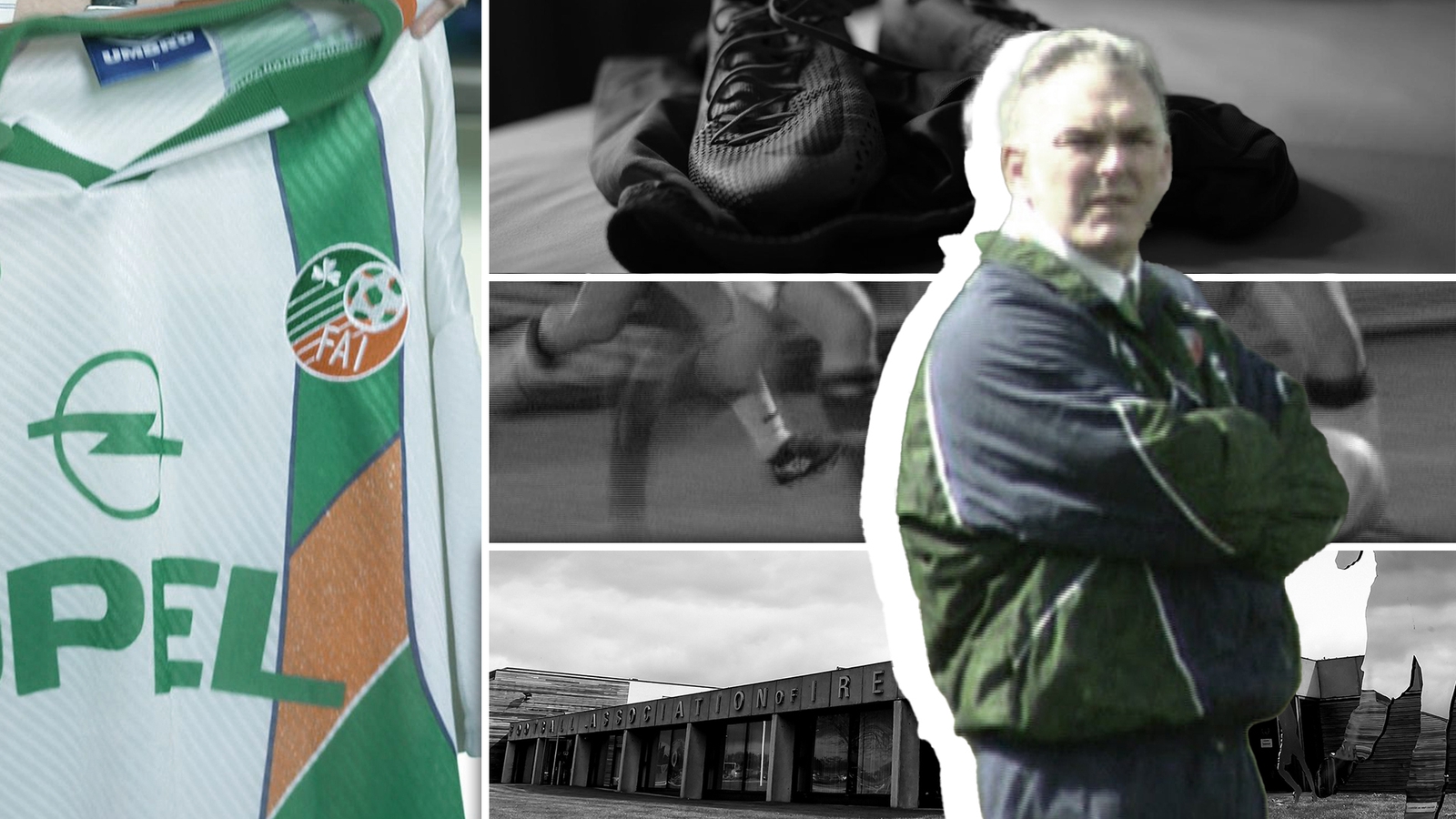By Marie Crowe and Mark Tighe
For more than two years, RTÉ and the Sunday Independent have been jointly investigating concerns about a culture that prevailed in Irish women’s soccer in the 1990s.
Women who were once young trainees on a course set up by the Football Association of Ireland and the State training and employment agency, FÁS, have spoken about experiencing predatory sexual behaviour from their head coach.
Many other women say the concerns extend beyond that, up to the culture around the women’s national team.
In a major documentary to be broadcast at 9:30pm tonight on RTÉ One television, several former national team players detail their experiences for the first time.
Katie Liston was a 22-year-old new recruit in the Ireland women’s national squad ahead of a November 1994 friendly against France in Cork. Both the senior and under-20s teams had games that day, and both squads travelled together, both were coached by Mick Cooke.
Liston, who played intercounty Gaelic football for Kerry and was an athletics star in her teens, got into soccer when she moved to Dublin to study sociology in UCD in the mid-1990s.
Now a lecturer in sociology in the University of Ulster, she had dreamed of a long career in international football.
Yet, she says, before she could establish herself as a fixture in the Ireland set up, her desire to play international football was unexpectedly extinguished.
Looking back, she recalls – like many of the gay women who played for Ireland under Cooke – how a homophobic atmosphere was created by the coach.
“If my daughter said she wanted to go into that environment I would’ve never allowed my daughter to go there. Never. It wasn’t safe for younger people.”
She recalls Cooke and his assistant Bobby Geoghegan pulling her aside at the team hotel in Cork in November 1994, ahead of a match against France.
“At the time, I thought it was on the pretense of perhaps getting some feedback on how I was playing, or how we were to play, ways to improve,” says Liston, about Cooke.
“But it was nothing to do with football. I was told that they were ‘getting rid of the lesbians’ and that had a chilling effect on me.”
“I can recall exactly where I was sitting, the noise that was around me in the hotel foyer. It wasn’t a conversation because I didn’t have a voice. And I knew then that my international career was over before it had ever really started.”
A gay woman who won four All-Irelands with Kerry and who also played international rugby for Ireland, Liston says Cooke’s comment about removing gay players from the squad deeply unsettled her.
“The effect of that conversation was to reinforce the shame that I was trying to unshackle,” she says, “so psychologically I checked out, in a sense.”
“My overriding sense… was that gay women were being stigmatised, that they were not welcome, that they were deviant, maybe even predatory, that they were a social ill.”
Lisa Curran has similar memories from her time playing international football for Ireland while Cooke was in charge.
“It was never hidden,” she says, referring to the homophobia. “I don’t know why anyone would think it was hidden. It was open.”
An attacking midfielder from Dublin, Curran was one of the few Irish female players in the 1990s to become an overseas professional, spending three years playing in Italy.
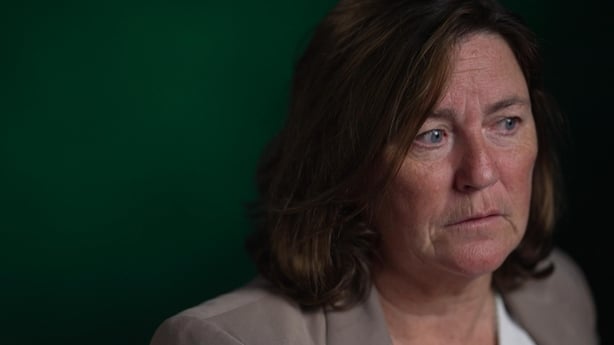
One of the reasons she came back home in 1997 was that she wanted to “expose” Cooke.
She believed he was homophobic, overly aggressive, and was having relationships with some of the players.
Unsuccessful in her efforts, she said she left the camp. “There was no point, and I walked away from it.”
By it’s own admission, the FAI was not focused on women’s football at the time.
According to the then-CEO, Bernard O’Byrne, the Association took a ‘hands-off’ approach to the women’s game.
“Within football it was as though they operated in a little bubble over there,” he said.
“There was no agenda against them, but there was no great interest in ladies football from the majority of people that were sitting around the board of the FAI. It’s just the way it was in those days.”
O’Byrne recalls meeting Mick Cooke – the manager of the women’s national team for almost the full duration of his tenure as FAI Chief Executive – just once.
At the meeting, Cooke went on what O’Byrne believes was a “homophobic rant.”
O’Byrne says he remembers it well because Cooke turned up at the FAI’s then headquarters in Merrion Square without an appointment and demanded to see the Chief Executive. O’Byrne agreed to give him 10 minutes before lunch.
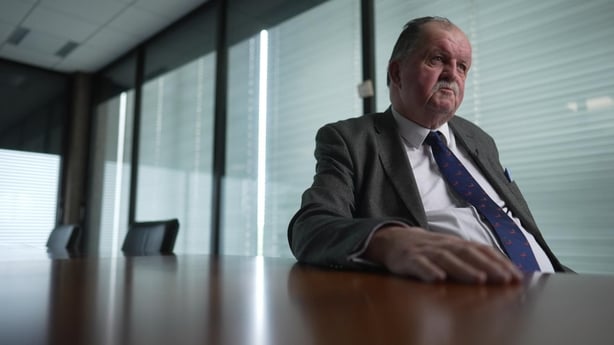
He says Cooke was so agitated that he refused to take a seat and remained standing throughout the meeting. “And it wasn’t so much a meeting as a rant really by Mick,” says O’Byrne.
“He was very upset.”
“First of all, he wanted to say that there was a group of senior women in the dressing room who he incidentally described as all gay, who were undermining him as a coach and that it was intolerable and it shouldn’t be allowed to happen.”
He said Cooke also said it was not “fair” for him to bring young girls into the international set up.
“He says, ‘I’m just telling you as chief executive’,” O’Byrne recalls. He says Cooke also aggressively warned him that he “can’t tell anybody that you didn’t know.”
After gathering his thoughts, O’Byrne says he asked Cooke if he expected him as Chief Executive to go into the team dressing room to tell the players to respect their manager. He says he told him if what he described was in fact the case, Cooke had already lost the dressing room – and that as Chief Executive he would not be interfering.
If it was a serious complaint, O’Byrne recalls, he told Cooke he would need to put it in writing or bring in somebody to corroborate his complaint. O’Byrne says Cooke immediately declined to follow up on his complaint.
In the legal letter in response to written queries from RTE and the Sunday Independent, Mick Cooke denied he made a “homophobic rant” to Bernard O’Byrne.
A letter from his solicitors said “people we have spoken to expressed shock at the allegations in your letter… They were of the view that the atmosphere around the international team during Mr Cooke’s tenure as manager was excellent, he fostered a great team spirit and many of the players often expressed the view it was the time of their lives.”
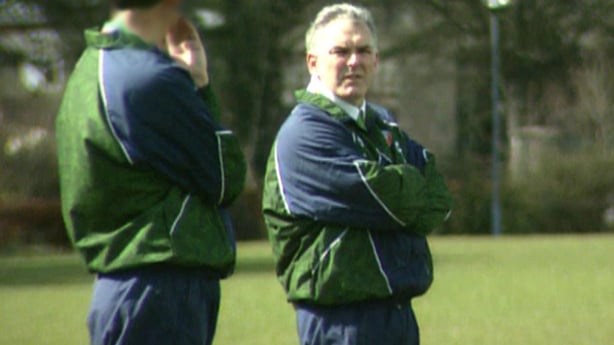
It wasn’t just gay players who told RTE and the Sunday Independent that they were uncomfortable with Cooke’s management.
A month after making her debut, 18-year-old Alice was due to earn a second cap against France when, in the team hotel, Bobby Geoghegan, Cooke’s assistant, found her sitting her on a chair in teammate Katie Liston’s room.
She says she was told to “get the f**k out” and to get back to her own room, but she protested that they were just talking.
Some time later, she said Cooke and his assistant arrived at the door of her room. After she let them in, she says she was told to sit on her bed.
Alice remembers Cooke warning her that she was like “new blood” to the older players.
Read more: Female players say ‘our eyes have been opened’ in new statement
“He said, ‘these are all vampires here and if you want to ride whoever you want to ride, you’re not going to do it while you’re playing international soccer,’” recalls Alice.
Protesting that Cooke had misinterpreted the situation, she said that she had a boyfriend who was sitting downstairs in the hotel lobby.
“Right,’ he said, ‘let’s forget about this. Give me a kiss,’” she recalls.
“I’m at the end of the bed and, like… I did. I just… And he’s giggling and laughing, and walked out of the room. And I was left physically, I went into the bathroom and I physically got sick.”
She says she was left thinking “what just happened? Is it normal? Is this what it’s all about? I couldn’t get my head around it.”
In his legal letter, Mr Cooke denied ever kissing Alice “or indeed any player.”
Another former player, Jackie McCarthy-O’Brien, also recalls an unwanted kiss from Mick Cooke in a team hotel room.
In October 1993, McCarthy-O’Brien played as a substitute in a match against Northern Ireland, her 13th international appearance.
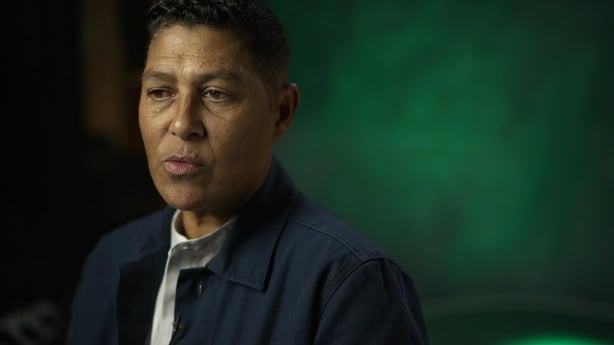
Afterwards, she remembers Cooke passing her in the lobby of the Sligo Southern, the team’s hotel, and asking her to meet him in his room.
Then 32 years old, she says she had heard rumours among the squad that Cooke had hit on some players. She thought, as an openly gay woman, that would not be a concern for her.
Still, she says she made a quick plan with a friend who had come to see the match that if she had not reappeared after a few minutes her friend would come looking for her.
Inside, she said Cooke asked her to sit on his bed and they began talking about the match.
“And then the next thing,” she said “it’s like he’s leaning over and grabbing you by the shoulders to kiss you and kisses you on the lips. And I’m like, gobsmacked. Gobsmacked.”
“How do I get out of here? What do I do?” she says she was thinking.
“Do I give him a kick? Do I give him a slap? Oh, there’s the end of your career — it’s kind of a life flashing before you in a few seconds and you just go numb.”
McCarthy-O’Brien would never again get a call up to the Irish football squad. She went on to play rugby union for Munster and earned 13 international rugby caps for Ireland.
Mick Cooke said in a statement that Jackie McCarthy-O’Brien “was not dropped from the national squad for any reason other than footballing reasons.”
Mick Cooke went on to coach several League of Ireland clubs. Most recently he coached the Dublin City University women’s team.
DCU said “from January 2019 to March 2020, Mr Cooke was paid via payroll and from September 2022 to March 2024, he was paid travel expenses as a volunteer coach.”
It said his involved with the team “concluded at the end of the 23/24 football season (March 2024).”
On March 15, 2024 the FAI issued a ‘stand down’ notice to Cooke, having learned of some the details of the joint RTÉ/Sunday Independent investigation through the Professional Footballers Association of Ireland (PFAI).
The FAI concerns and complaints policy gives it the power to issue stand down orders to any person who is the subject of a complaint or inquiry by a statutory body. It is made for the immediate protection and safeguarding of children and vulnerable persons and is not a determination of wrongdoing by any individual.
Contacted by this investigation, Cooke said he was “absolutely floored” to be told that his former players had made allegations of inappropriate behaviour against him.
A subsequent legal letter from his solicitors said “all of the allegations in your letter of the 24th of June are denied.”
The joint investigation team spoke with Bobby Geoghegan. He did not respond to follow-up questions.
RTÉ Investigates: ‘Girls in Green’ broadcasts tonight at 9.30pm on RTÉ One television

